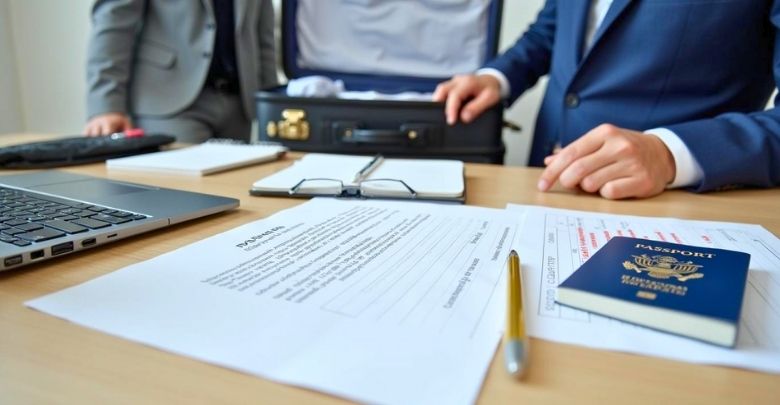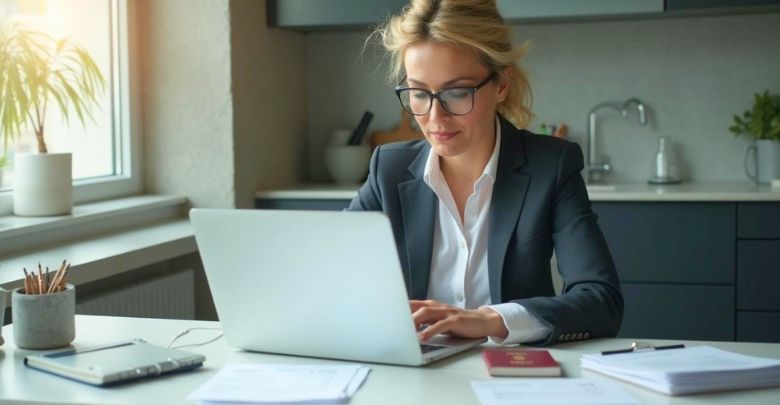The process of applying for a conference visa to the USA can be complicated and calls for preparation and the right paperwork. If you plan to attend a conference while your student visa application is still pending, you may wonder about the steps involved. You might have the question in mind: How do I apply for USA conference visa while my student visa application is under process?
Applying for a USA conference visa while your student visa is in process is possible with proper planning. Submit a DS-160 form, schedule an interview, and present proof of financial support and a conference invitation letter. Clearly explain that your visit is temporary and unrelated to your student visa.
Are you curious about how to manage both visa applications without issues? This article covers every necessary detail, from documentation to interview tips, ensuring a smooth process. Keep reading to understand the step-by-step guide and avoid common mistakes in your application.
Step-by-Step Guide on How Do I Apply for USA Conference Visa While My Student Visa Application is Under Process
It may seem difficult to attend a conference in the United States while your application for a student visa is still pending. However, with the right approach, you can apply for both without issues. Below is a step-by-step guide to help you understand and complete the application smoothly.
Step 1. Understand the Visa Types You Need
The USA provides different visa categories depending on the purpose of travel. To attend a conference, you will need a B-1 visa (Business Visitor Visa). It is different from a student visa (F-1). Make sure you apply for the correct category to avoid unnecessary delays or complications with your applications. Carefully check the visa requirements before proceeding.
Step 2. Ensure Your Passport is Valid
Before applying for your visa, check your passport’s expiration date. The US government requires your passport to be valid for at least six months beyond your intended stay. If your passport is close to expiring, renew it as soon as possible. An expired or soon-to-expire passport can cause delays or even visa rejection.
Step 3. Gather the Required Documents
Proper documentation is essential for a successful visa application. You will need your passport, a DS-160 confirmation page, a visa fee receipt, and proof of financial support. If you are applying for conferences in USA with invitation letter, ensure the letter clearly states event details, sponsorship (if any), and the necessity of your presence. Keep all documents well organized.
Step 4. Fill Out the DS-160 Form Correctly
The DS-160 form is the official online visa application form for the US. Fill it out carefully, ensuring that all information is correct and matches your supporting documents. Mistakes or inconsistencies can cause delays or rejection. Once completed, print the confirmation page with the barcode, as you will need it for your visa appointment.
Step 5. Schedule and Prepare for Your Visa Interview
After submitting your DS-160 form, schedule an appointment at the nearest US embassy or consulate. Appointment slots fill up quickly, so book early. Prepare well for the interview by reviewing common questions. Be ready to explain why you want to attend the conference and how it relates to your studies or career.
Step 6. Pay the Visa Fee and Keep the Receipt
The visa application process requires a non-refundable fee, which must be paid before your interview. Payment methods vary by country, so check the embassy’s website for details. After payment, keep the receipt safe, as you will need it for verification. Without proof of payment, you cannot proceed with the visa process.
Step 7. Attend Your Visa Interview With Confidence
Your visa interview is a crucial part of the process. Dress formally and answer questions clearly and confidently. The interviewer may ask about your student visa application, your reasons for attending the conference, and your plans after the event. Be honest and provide documents to support your statements. A well-prepared interview increases your approval chances.
Step 8. Explain Your Temporary Intentions Clearly
Since your student visa application is still in progress, clarify that your conference visit is temporary. Show strong ties to your home country, such as family, job, or educational commitments. The visa officer must be convinced that you intend to return after the conference and not stay in the USA beyond the permitted period.
Step 9. Monitor Your Visa Status After the Interview
After your interview, you can check your visa status online using the application tracking system. Processing times vary, so remain patient. If your visa is approved, follow the instructions for passport collection. If denied, you can ask for reasons and consider reapplying if necessary. Stay updated with embassy guidelines for a smooth process.
Applying for a conference visa while your student visa is in process may seem complicated, but it is manageable with proper preparation. Follow each step carefully, ensuring accuracy in your application and confidence in your interview. Planning ahead will help you avoid delays and increase your chances of getting approval.
Can I Hold Both Student and Conference Visas Together?
Holding both a student visa and a conference visa at the same time can raise questions about legality, requirements, and practicality. Knowing how these two visas work together is crucial for those planning to attend events while studying abroad. Find out more in the subheading below.
Visa Regulations for Holding Two Visas
Each country has specific rules regarding holding multiple visas. In most cases, a student visa allows you to study, while a conference visa lets you attend events. Check the regulations in your host country to see if holding both is allowed. Always seek confirmation from immigration authorities.
Potential Restrictions on Visa Types
Some countries impose restrictions on holding multiple visas, especially if one is related to employment. You may face challenges if the student visa limits your work or activities, while the conference visa has its own set of rules. Research your country’s specific visa guidelines.
Application Process for Two Visas
Applying for both visas may require extra paperwork. You will need to show proof of enrollment in an academic program for the student visa and proof of invitation or registration for the conference. Ensure all requirements are met to avoid delays or rejection.
Duration of Both Visas
The validity period of both visas may differ. A student visa often lasts for a longer time, while a conference visa is temporary. Make sure your conference visa’s duration does not conflict with the duration of your student visa. Plan your travel dates carefully.
Handling Visa Issues During Travel
If you plan to travel for a conference while studying abroad, make sure both visas are valid for the dates you’ll be away. Keep track of entry and exit requirements. Some countries may require you to re-enter with a student visa or offer exemptions.
It’s important to understand visa policies and requirements before applying for multiple visas. Always verify with the relevant authorities to avoid any legal complications, ensuring a smooth experience when studying and attending conferences.
Will Immigration Officers Question My Travel Plans Beyond the Conference?
When attending a conference abroad, travelers often plan additional activities, such as sightseeing or visiting friends. Immigration officers may ask about these plans to ensure compliance with visa rules. Here are a few key aspects of handling such inquiries smoothly.
Immigration Officers and Their Concerns
To make sure travelers adhere to visa requirements, immigration officers review travel itineraries. They may ask about your itinerary, accommodations, and return plans. If you’re traveling as a tourist on a conference visa, they might seek clarification about your leisure activities. Having a clear explanation about your schedule can prevent unnecessary questioning.
Common Questions During Entry Checks
Travelers may be asked about the purpose of their visit, their stay duration, and their plans after the event. If your schedule includes extra days for personal travel, be ready to explain how it fits within your visa’s terms. Clear and confident answers help immigration officers process your entry smoothly.
Essential Documents to Carry
Carrying proper documents can make immigration checks easier. A conference invitation, hotel reservations, and return flight details show you have a structured plan. If your visit includes tourism, additional travel bookings can demonstrate that your plans are accurate and within the allowed timeframe.
Handling Additional Inquiries
If officers ask further questions, staying calm and answering clearly is important. They may check if you intend to stay beyond the permitted period. Providing honest and consistent responses helps avoid complications. Being prepared with relevant details makes the process quicker and stress-free.
Best Practices for a Smooth Entry Process
Knowing visa rules before traveling can prevent unnecessary problems. Make sure your travel plans align with the visa’s conditions and avoid activities that might raise concerns. Having a straightforward plan and the right documents ensures an easy immigration experience.
Traveling with a conference visa while including personal activities requires careful planning. Immigration officers check for compliance, so staying honest and prepared helps avoid any issues. With the right approach, you can enjoy your trip without unnecessary delays.
What Financial Documents Should I Submit for Visa Approval?
Visa officers need to see proof that you can afford your trip and won’t face financial issues. Submitting the right documents helps strengthen your application. Below are the key financial documents you should provide to increase your chances of approval.
- Bank Statements: Submit at least three to six months of recent bank statements. They should show a stable balance and regular transactions to prove financial stability.
- Sponsorship Letter: If someone else is funding your trip, provide a signed letter from the sponsor along with their financial documents and relationship proof.
- Income Tax Returns (ITR): Provide tax return documents for the past two years. These show a consistent income source and help establish financial credibility.
- Pay Slips or Salary Certificate: Employees should submit their latest pay slips or an official salary certificate from their employer to prove steady monthly income.
- Fixed Deposits or Investments: If you have fixed deposits, stocks, or mutual funds, include statements to show additional financial security and backup funds.
- Property Ownership Documents: If you own property, submit the ownership documents. This helps establish strong ties to your home country and financial stability.
- Financial Affidavit: If required, provide an affidavit of financial support, especially if a relative is covering your expenses during the trip.
Providing clear and well-organized financial documents improves your visa approval chances. Make sure all documents are recent, authentic, and properly formatted. Being prepared ensures a smooth visa process and avoids unnecessary delays.
Can a Past Visa Denial Affect My New Application?
Visa applications go through a detailed review, and a previous denial can sometimes raise concerns in future submissions. However, having a clear understanding of the reasons behind a rejection can help in preparing a stronger application. Here are a few key aspects of this situation.
Impact of a Previous Visa Denial
A past visa denial does not mean automatic rejection in future applications. However, consular officers may review previous records to check for any unresolved issues. If the reasons for denial remain unchanged, it could affect the outcome. Addressing past concerns and submitting stronger supporting documents can improve the chances of approval.
Common Reasons for Visa Refusals
Visas are often denied due to insufficient financial proof, unclear travel intentions, or missing documents. One common refusal type is under Section 214(B), which is given when an applicant fails to prove strong ties to their home country. In such cases, overcoming a 214(B) visa rejection requires demonstrating clear reasons for returning home, along with improved financial and personal stability.
Ways to Strengthen a New Application
To improve approval chances, applicants should provide strong financial proof, complete documentation, and a clear travel plan. If a previous application was denied, submitting updated details that address concerns from the past can be beneficial. A well-prepared application reduces doubts and increases the likelihood of success.
Providing Clear Explanations During the Interview
During an interview, officers may review past visa records and ask about any previous denials. Providing honest answers while explaining any changes in circumstances is important. If the previous rejection was due to weak documentation, showing improvements in this area can help. Consistency in responses also plays a crucial role in building credibility.
Best Time to Submit a New Application
Applicants should only reapply after addressing the issues that led to the initial denial. Submitting the same information without any improvements may result in another rejection. Waiting until financial, employment, or personal circumstances improve can lead to a stronger application and better chances of approval.
A past visa denial does not mean future applications will fail. By understanding the reasons for rejection and making necessary improvements, applicants can submit a stronger case. Proper preparation and clear documentation can significantly increase the chances of visa approval.
FAQs About How Do I Apply for USA Conference Visa While My Student Visa Application is Under Process?
When applying for a USA conference visa while your student visa application is under process, you may have several concerns about the process, requirements, and potential challenges. To help you understand everything clearly, here are some frequently asked questions and their answers.
Can I Apply for a Conference Visa Before My Student Visa Is Approved?
Yes, you can apply for a conference visa while waiting for your student visa approval. However, you must clearly explain the purpose of each visa and ensure both applications are handled separately. Be prepared to show that attending the conference does not interfere with your student visa process.
What Happens If My Student Visa Gets Approved Before My Conference Visa?
If your student visa gets approved first, you can still proceed with your conference visa application. The key is to ensure that both visas are valid and do not conflict with each other. You should also inform the embassy about your plans to avoid any confusion during processing.
Can I Travel to the USA for a Conference While My Student Visa Is Pending?
Yes, but only if you have a valid B-1 visa for the conference. You cannot travel under a pending student visa status. Make sure your conference visa is approved before making travel arrangements. Also, provide evidence of your intention to return home after the event.
How Long Does It Take to Get a Conference Visa?
Processing times vary based on your country and the US embassy’s workload. Generally, it takes 2 to 8 weeks from the interview date. Scheduling your visa appointment early and submitting all required documents correctly can help speed up the process and reduce delays.
Will My Conference Visa Application Affect My Student Visa Approval?
No, applying for a conference visa does not directly affect your student visa application. However, the visa officer may ask questions to confirm your travel intentions. Ensure that you provide clear and honest answers to show that both applications are for separate purposes.
What Should I Do If My Conference Visa Is Rejected?
If your conference visa is denied, review the reason given by the embassy. You can reapply if necessary, ensuring that you address the concerns raised in your previous application. Providing stronger financial proof, a clearer travel plan, or additional supporting documents can improve your chances of approval.
Bottom Line
Attending a conference in the USA while your student visa is still in process may seem complicated, but with the right steps, it can be done smoothly. Knowing visa requirements, preparing documents carefully, and attending the interview with confidence can increase your chances of approval. Being well-prepared helps avoid unnecessary delays or rejections.
So, how do I apply for USA conference visa while my student visa application is under process?, the process involves applying for a B-1 visa, completing the DS-160 form, gathering required documents, scheduling an interview, and proving your intent to return home after the event. Following each step correctly ensures that your visa application is processed without issues.
Before applying, double-check your documents, financial proof, and travel plans to ensure everything is in order. Be honest in your interview and stay calm when answering questions. Planning ahead makes the process easier. Best wishes for your visa approval and a successful conference experience!








